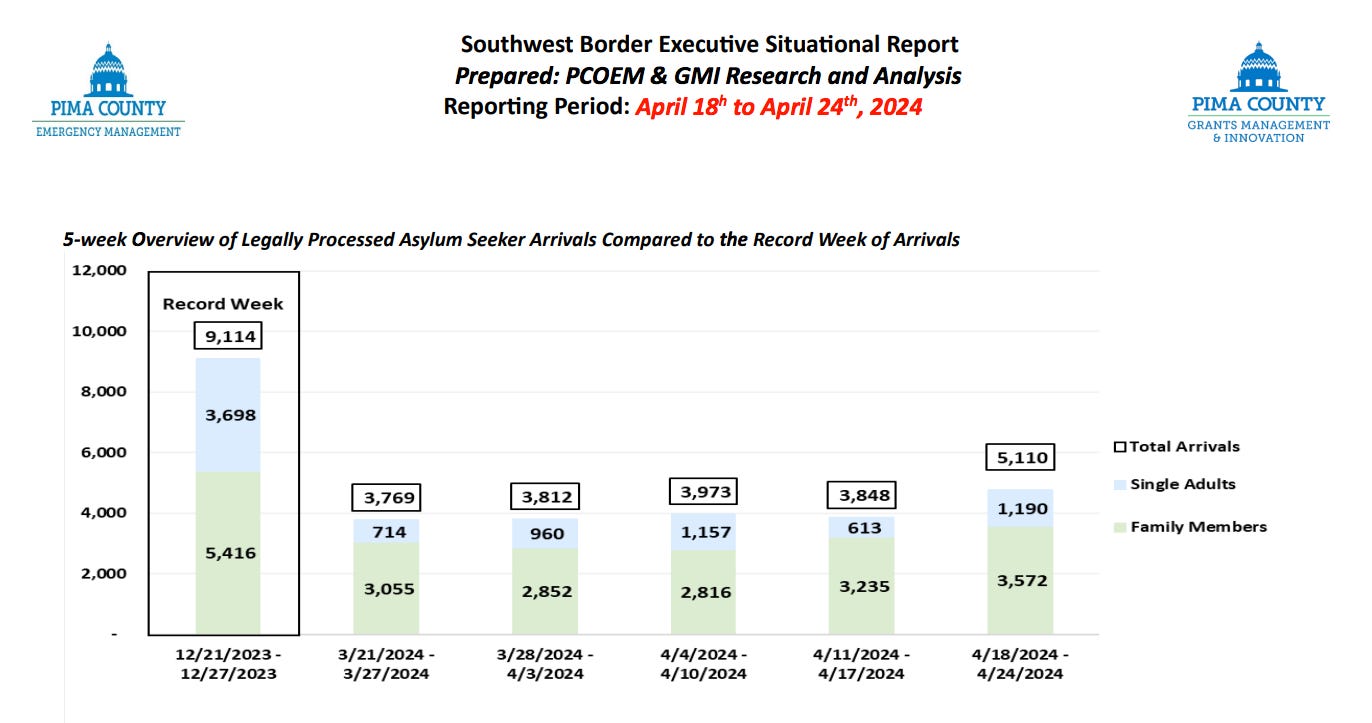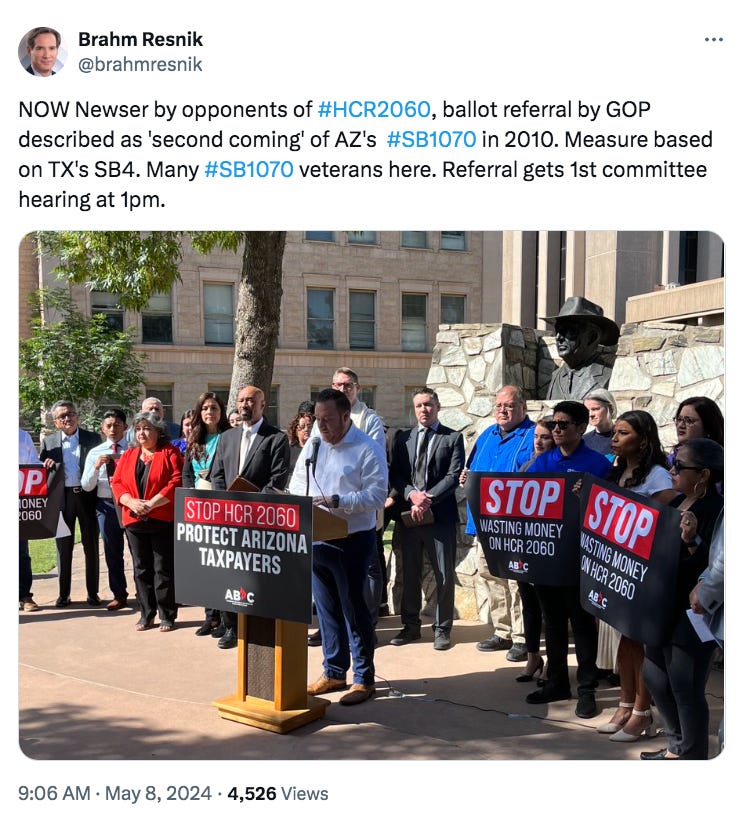The Daily Agenda: Staying informed is easier than you think
Put this one in your civic toolbox ... Pima County's weekly reports on asylum seekers ... Judge nixes lawsuit over homeless encampment.
The local conversation about asylum seekers got pretty intense a few weeks ago.
Federal officials were dragging their feet about continuing to fund efforts to support asylum seekers while they’re in Tucson. Everybody from the mayor of Tucson to the Pima County supervisors to the Arizona governor was scrambling to figure out what to do if the money dried up.
Luckily, fewer asylum seekers came through Tucson than officials anticipated, and the federal government ended up allotting $21 million to Pima County. That gave local officials some breathing room, probably until the end of the year.
The issue inevitably will come up again, as it did at the county supervisors meeting on Tuesday, when Supervisor Steve Christy wanted to know when the $21 million will arrive (and waved around a report about flights to Texas that Pima County has nothing do with).
It’ll probably happen again when Customs and Border Protection releases its monthly data in the next few days. In the past, that’s brought right-wing media and politicians to Tucson, where they demand to be let into shelters and ask shelter staff all sorts of questions.
So we’d like to highlight a tool that can help the public understand how the system works and what to make of it.
Every week, Pima County puts out a “Southwest Border Executive Situational Report” that’s full of statistics on asylum seekers. The reports also sketch out the coordinated ballet performed by officials and nonprofits to make sure asylum seekers are safe during the few days they’re in Southern Arizona.
The reports are available to the public, so you’re free to peruse them yourself. Or you can just take note of them and watch as they appear throughout local news coverage of asylum seekers, including in the Tucson Agenda. These reports underpin a lot of local news about asylum seekers, just like CBP’s stats do for national coverage.
If you’re new in town, it can be hard to get caught up on local government and politics. That’s what we’re here for!
So what can we learn from these reports? The one for the week of April 18-24 came up at the supervisors’ Tuesday meeting, so let’s use that one.
More asylum seekers came through Tucson than in previous weeks. The total had held fairly steady at about 3,800 per week since March, but it reached 5,100 from April 18-24. That’s an average of 730 people arriving every day to the Casa Alitas Welcome Center.
It did not overwhelm the shelter system. County officials described it as “manageable” and said they didn’t have to use their overflow shelters.
It’s still far behind the record-setting week. The busiest week on record was 9,100 asylum seekers in mid-December.
Most of them are families. The county reported 70% of asylum seekers who came through Tucson that week were traveling as families, while most of the others were single adults.
They are busing more asylum seekers to Phoenix. The reports don’t give an exact number, but a colored chart shows thousands of asylum seekers were bused to Phoenix in March and April. This came up as a priority for Tucson officials a month ago, given that many asylum seekers are trying to get to the Phoenix airport to fly to their final destinations.
They’re not using cabs much anymore to move people among shelters or to get to bus stations or airports. Up until January, they depended almost exclusively on cabs, but they didn’t use them at all in March or April. Instead, they used shuttles for all short-distance transportation.
You also can find descriptions of the services offered to asylum seekers or how the different agencies and nonprofits work together, such as the Arizona Department of Emergency and Military Affairs busing asylum seekers to Tucson shelters from border towns like Nogales and Douglas.
As County Administrator Jan Lesher answered Christy’s questions on Tuesday, she also said she wants to get the county out of the business of dealing with asylum seekers by the end of the year. It’s the job of the federal government, she says, not counties.
You can bet there will be many discussions in the coming months about who should take over and whether the county will have any role at all next year. Those discussions likely will revolve around the information in the weekly reports.
That’s just at the county. Immigration is going to be a key issue in the presidential elections. A lot of people crossed the border during Biden’s administration and Trump obviously sees immigration as a winning issue.
So do Republican state legislators. As they gear up for the campaign trail, one of their final legislative pushes is to send a ballot measure to voters, HCR 2060, that would essentially install the infamous SB 1070 from 2010.
That’s where the county’s weekly asylum reports come in. They can help you sort through what’s actually happening and what’s just hot air.
The reports are available at the county’s “Southwest Border Information and FAQs” page on their website.
Contracts cut: The University of Arizona is eliminating some instructor contracts, but says the cuts aren’t layoffs, but rather “renewal decisions,” the Arizona Republic’s Sasha Hupka and Helen Rummel report. The cuts largely impact career-track faculty hired on fixed-term contracts who aren’t eligible for tenure. UA officials confirmed the cuts, but couldn't immediately provide details on how many instructors received contract non renewal notices. A UA spokesperson told the Republic that the cuts were unrelated to the financial crisis.
Opening statements: The trial of a former graduate student accused of fatally shooting UA hydrology professor Thomas Meixner in October 2022 began Tuesday, the Arizona Daily Star’s Prerana Sannappanavar writes. Prosecutors told jurors that Murad Dervish had a plan that he executed with intent and that it would be important to pay attention to his actions before, during and after the shooting. Defense attorneys did not make an opening statement.
Claim rejected: A Pima County judge rejected a lawsuit involving a homeless encampment in Navajo Wash, saying city officials aren’t responsible for the “public nuisance” created by its residents, the Tucson Sentinel’s Paul Ingram writes. Judge Greg Sakall said the city isn’t liable for the actions of people camping in the wash and the plaintiffs failed to show that the city caused their alleged injuries. The lawsuit was filed last year by two homeowners from Hedrick Acres Neighborhood and a nearby business owner.
For sale?: Pima County supervisors discussed Tuesday selling the county-owned Banner-UMC South, a 45-year-old facility on the city’s south side, Arizona Public Media’s Steve Jess reports. The board approved a five-year extension of Banner Health’s contract to run the facility (to the tune of $15 million a year) but said they were open to other arrangements, including selling the hospital to Banner. Banner’s CEO, Bob Evani, says he’s open to a potential sale.
New plan: Officials from the U.S. Customs and Border Protection, the Drug Enforcement Agency and Homeland Security Investigations announced a new collaborative strategy called “Operation Plaza Strike” to target mid-level drug smugglers in Mexico and along the U.S.-Mexico border, the Arizona Luminaria’s John Washington writes. Operations will begin in Nogales, Sonora and focus on the Sinaloa cartel’s smuggling networks. The agencies will go after “plaza bosses,” with officials saying that more than 90% of all narcotics smuggled into the U.S. are under the control of border plaza leadership,
Travel through time: The Southern Arizona Museum of Science and Technology is now open in Sierra Vista and showcases the natural history of Cochise County, KGUN’s Blake Phillips reports. The museum includes exhibits featuring fossils, gems, minerals and information about the geological history of the region. Its goals are to get kids interested in STEM education and increase tourism to the area.
464,000: The number of asylum seekers who have come through shelters in Tucson since the start of 2019.











Thanks for the info on where to get the facts on immigration. And thanks again for excellent coverage of Tucson issues.
A "nonrenewal" has the same financial impact as getting laid off.